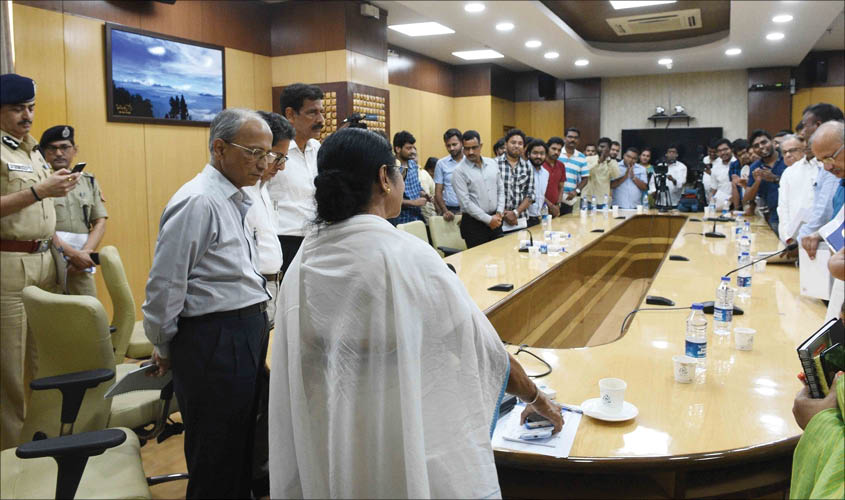Kolkata: Stung by the results of the recent Lok Sabha elections, West Bengal Chief Minister Mamata Banerjee is trying to do some damage control and has ordered her party leaders to return all the “cut (bribe) money” they have taken for the implementation of government projects. The extortion of money by Trinamool Congress (TMC) leaders at different levels is one of the reasons why there is widespread anger against the Mamata Banerjee government in the state. However, Mamata Banerjee’s diktat has led to infighting among TMC leaders, apart from criticism about too little and too late.
Ever since she has issued the diktat, the state has been witnessing a series of protests by common people who had to pay “cut money” to avail of different government schemes. On Wednesday, one faction of TMC workers clashed with another group in Bolpur over returning the the “cut money”. Incidents of similar clashes were reported from Galsi in Burdwan district, in South 24 Parganas district and from Sinthi More in Dum Dum on the outskirts of Kolkata.
The Bharatiya Janata Party feels that by issuing this diktat, Banerjee is trying to create more trouble in the state. Taking a dig at Banerjee’s nephew Abhishek Banerjee, Dilip Ghosh, state BJP president has said, “The West Bengal government is lying on a bed of corruption. Will Banerjee take the initiative to arrest each and every individual who is corrupt? We are investigating how Banerjee’s nephew himself is running an illegal business in Singapore.”
While Shatabdi Roy, TMC MP from Bolpur has been quoted as saying, “Chief Minister Mamata Banerjee should have issued this diktat earlier. We have found that after this diktat, people are now going to the houses of individual TMC workers and leaders and demanding that they return the bribe money they have taken. She has given an important message to the public that the corrupt inside the party will not be spared.”
The Kolkata Municipal Corporation (KMC) actually issued a notice on Thursday saying that no one would have to give any “cut money” to get work done in any municipality or in the KMC. The notice also mentioned that people should not give money to any middleman for any municipal service.
The diktat to party leaders to return “cut money” is among several damage control measures that Mamata Banerjee has taken in a short span of just one month in the hope to regain her lost ground ahead of the Assembly elections of 2021. She may have finally woken up to the fact that she is facing huge anti-incumbency—that government employees are unhappy with her, that the common man has been deprived of scheme benefits due to her party’s middlemen, and that her rampant minority appeasement has alienated large sections of the Hindu population in the state. After the results of the Lok Sabha polls were declared, where her party got 22 seats and the BJP 18, Banerjee announced an extension of the tenure of the Pay Commission. Although she continued to boycott meetings called by the Centre, her tone has been mellow. Observers say that she is desperately hoping that her explanation for the boycott might benefit her narrative of negligence by the Union government.
Political analysts are of the opinion that Banerjee should have issued the cut-money diktat earlier, which she did not perhaps because she was well aware of the infighting in her party regarding “shares in the cut money”.
Maidul Islam, a senior political analyst with the Centre for Studies, said: “Mamata Banerjee wanted to give the message that she should not be blamed if benefits of government projects were not reaching the people. Instead of taking direct action on her party supporters, she seems to have decided to leave it to the people. Her public discourse is intended to change the perspective.”
Another one of Banerjee’s important reconciliatory steps was her meeting with junior doctors at Nabanna (the state secretariat), when she finally swallowed her ego to sit down with them for a discussion on their srike. Bibhas Chakraborty, an eminent intellectual, said: “After almost the five-day crisis in state-run hospitals, finally, Banerjee showed patience and listened to the junior doctors to resolve their security problem. Known as a firebrand leader with too much arrogance, her step ultimately led to a positive outcome.”
According to Professor Islam, Banerjee’s instruction to the police to arrest the culprits despite their political colour and religion was an attempt to refurbish her image.
She may have understood that her decision to project herself as a secular leader—in other words, an appeaser of a particular minority community—who would be an alternative to Prime Minister Narendra Modi infuriated the majority community who felt threatened and marginalised. It was because of this that on Monday she dropped the chairman of the over 200-year-old Tarakeshwar temple development board, Firhad Hakim, a Muslim, and appointed Ratna De Nag, who lost the Hooghly Lok Sabha seat, to the post.

